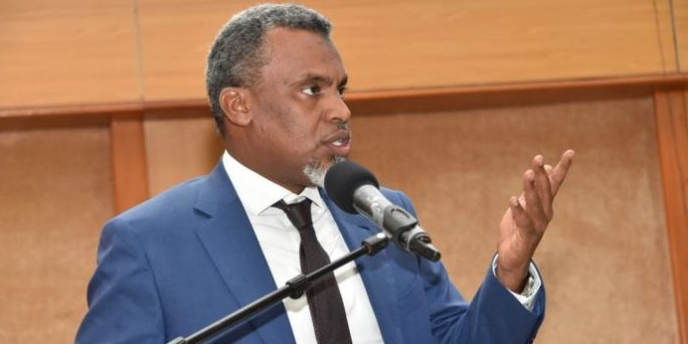
Duale defends Haji, DCI boss Amin from leaders’ attacks
The Environment CS says the two are being profiled for coming from Northeastern
The lecture marks a turning point in how the intelligence agency relates with the public.
In Summary
 National Intelligence Service Director General Noordin Haji. /FILE
National Intelligence Service Director General Noordin Haji. /FILEThe National Intelligence Service has hosted a public lecture engagement with the Kenyan public and the media.
Director General Noordin Haji delivered the historic and first-ever public lecture at the National Intelligence and Research University (NIRU) in Nairobi.
While intelligence has long operated in the shadows, Haji acknowledged the need for a new era of transparency and engagement in the information age.
“In a democratic state, silence must never be mistaken for impunity,” he said, emphasising the need to balance operational secrecy with public accountability.
He, however, warned of the dangers of overexposure.
“If a blanket keeps you warm through the storm, it may not always be wise to unravel the stitches to understand how. In seeking to know every thread, you may undo the very thing that shields you.”
The lecture marks a turning point in how the intelligence agency relates with the public—no longer as a distant, opaque institution, but as a responsive service evolving with the times.
“Citizens want details. They want timelines. They want names,” Haji noted, adding that public understanding and trust are now essential to national security.
The event brought together a diverse audience including members of the media, academia, corporate sector, faith-based organisations, civil society, and non-governmental organisations.
Those present included Law Society of Kenya president Faith Odhiambo, Chief of Defence Forces Gen Charles Kahariri and Attorney General Dorcas Oduor among other prominent state officials.
Haji shed light on how the NIS is addressing insecurity by tackling its socioeconomic roots.
He cited underdeveloped regions where children lack access to education and are at risk of recruitment into banditry and extremism.
“The child who cannot access education because of insecurity is the same one who may become a bandit, a terrorist, or a trafficker—and then we spend even more to fight them later,” he said, describing this as a shift from reactive to preventive security.
Addressing regional instability, Haji warned that conflicts in Ethiopia, Sudan and South Sudan could trigger refugee influxes, arms and drug trafficking, and cross-border crime.
“These developments are straining our resources and complicating our efforts to promote integration and peace. The instability of our neighbours directly impacts our own safety and prosperity,” he noted.
The DG also issued a strong appeal for media responsibility and national unity, stating: “The media is no longer just a mirror—it is a moulder of minds. Let us use our voices not to divide, but to uphold the truth and protect the republic.”

The Environment CS says the two are being profiled for coming from Northeastern